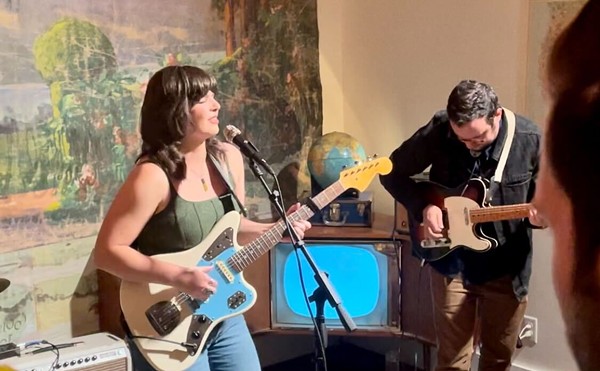Jon Langford and Sally Timms' new Songs of False Hope and High Values (Bloodshot) steps gingerly between politically charged folksiness -- Langford's precise but impassioned take on Eric Von Schmidt's protest classic "Joshua's Gone Barbados" -- and the stylized, intellectual wordsmithing and raw, flashless musicality of the duo's most important band, the Mekons. It's a modest, instantly convincing work of folk art. "The record came about because Sally and I were doing the Calgary Folk Festival," Langford says. "We put together a short tour and decided we needed a record as well. I had a few tracks; Sally had some things she wanted to do. We recorded a lot of it in my home, and some of it sounds better than the studio tracks."
If the names Langford, Timms and the Mekons mean nothing to you, then you've been boycotting the RFT music section or perhaps you've just returned from 20 years in Kamchatka. The Mekons have been a British folk-punk collective since 1979, and few bands have survived so much critical slathering or perplexed so many. "The Mekons had this folk thing in England in the '80s," Langford says, "but it never really worked for us. We just played what we wanted to play. Like any clique, the majority of people in that clique were fairly conservative. It's the same in alternative country. The Handsome Family have had that problem. But maybe by donning an acoustic guitar, it's like meeting those people halfway."
If the three-week tour and limited-edition eight-song EP were casually assembled, the music -- acoustic guitars, banjos, Dobros, bicycle bells -- intimates more. Why Timms is such a compelling interpreter of country music becomes clear on "Blue Eyes Crying in the Rain," a Willie Nelson song virtually every country singer alive has attempted and the last song, so say reports, to pass Elvis Presley's lips before they went cold. Timms' voice is just so damp and blue, just such a dying ember, just such a drifting memory untethered through the ages. She doesn't sing as well as Kitty Wells, but she embodies the song's spirit. Langford's originals (four co-written with Timms) join writerly smarts and proletarian vernacular in images of holocaust -- "Goodbye Dr. Strangelove, he knew he had to go" -- and souls "evolving discreetly," objects flying up magically into hands, uncontrollable dreams, horses jumping through hoops of fire. That's the stuff of folk music, what Bob Dylan called "historical-traditional music ... something that nobody can touch."





